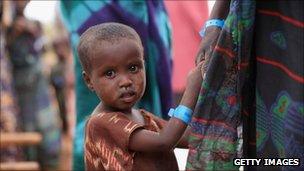Britons donate £72m for East Africa drought aid appeal
- Published
- comments

Aid agencies estimate that some 10 million people have been affected by the drought in East Africa
The British public has donated £72m for victims of the devastating drought in East Africa, the most ever for a food crisis, UK aid agencies have said.
The Disasters Emergency Committee (DEC) launched an appeal in July after the worst drought in Somalia, Kenya, Ethiopia and South Sudan for 60 years.
The DEC, representing 14 UK aid groups, said it had raised the third highest appeal total in its 45-year history.
But the charity said the situation for 10 million people remained "grave".
International Development Secretary, Andrew Mitchell said: "The British public has shown itself to be characteristically generous when help is needed most.
"British aid efforts are saving millions of lives. Unfortunately many people remain at risk, with the threat of disease when the rain eventually comes. That is why we are continuing to work hard to ensure we help people through this difficult period."
DEC chief executive Brendan Gormley said British support had "made the difference between life and death" for many people, and donations had enabled it to offer aid to nine million people.
The total raised by the appeal was the largest amount raised by the DEC for an African appeal, and the largest for any country or regional appeal where conflict was one of the principle causes of a disaster, he said.
More money was raised only for the 2004 Tsunami Earthquake Appeal (£392m) and the 2010 Haiti Earthquake Appeal (£107m), said Mr Gormley.
But he said many of those in greatest need were still not being reached by the aid effort.
"The situation remains grave particularly in those areas of Somalia where access for most aid agencies remains severely restricted," said Mr Gormley.
"We must also confront the hard truth that the worst of this crisis could have been averted."
Effective warning systems had been put in place following the 1984-85 famine in Ethiopia, said Mr Gormley.
But he added: "It was not the warning systems that have been found wanting but the ability of world leaders to support and resource regional governments, the UN and aid agencies to ensure there was early and effective action, particularly in war-torn Somalia.
"All of us should examine the roles we have played and consider what we must do to ensure that the next time the alarm is raised our immediate response is not found wanting."
Signs of improvement
Some affected areas of Kenya and Ethiopia are beginning to see the first signs of improvement, the DEC said.
Increasing amounts of aid is getting through, harvests are being reaped in many areas and rains are making more pasture available for surviving livestock, according to the charity.
But the DEC warned that many people in these areas still needed support and would need longer term aid in the coming years to rebuild their livelihoods.
The DEC appeal was launched on 8 July with the broadcast of appeals by the BBC, ITV, Sky and Channel 4. The appeal will run until the end of this year.
